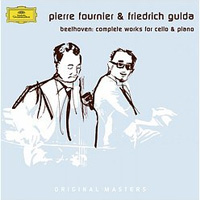 |
| February 1, 2007 Fournier and Gulda in Beethoven
His involvement -- with the music itself, with his colleagues, with his audience -- invariably raised everyone’s level of participation and response. Fournier put his phenomenal sound to work in what might be described as an endless procession of discoveries and confirmations, in the exalted intimacy of the Bach solo suites and in the warm jubilance of the Dvorįk Concerto (particularly his 1962 recording with George Szell and the Berlin Philharmonic, on DG), and he was no less committed in his performances of chamber music, most particularly in Beethoven’s five sonatas and three sets of variations for cello and piano. In the early postwar years he played those duos with the revered Beethoven pianists Wilhelm Kempff and Artur Schnabel; he recorded them with Schnabel in the late 1940s for HMV and got round to recording them with Kempff for Deutsche Grammophon in live recitals in Paris in 1965. (He and Kempff also recorded Beethoven trios about then, with the violinist Henryk Szeryng.) Naturally, DG transferred the Fournier/Kempff recordings to CD more than 20 years ago, but collectors who had the cellist’s 1959 recordings of the sonatas and variations with Friedrich Gulda (1930-2000), on the same label, weren’t about to give them up. Those performances were not recorded in stereo, but they had an electricity about them, a level of give-and-take that proclaimed, "This is what chamber music is all about."
There is also in the booklet, though, a brief but revelatory recollection by Fournier’s son (and sometime accompanist) Jean Fonda, confirming the very special rapport between Fournier and Gulda that is suggested in every bar of these magical performances. This was a rare level of collaboration. The senior cellist and the younger pianist (not yet 30 when these recordings were made) did not merely revere these works, but adored them and drew sustenance from them. One is reminded of Stravinsky’s remark when he was accused of mishandling the music attributed to Pergolesi in his arrangements of it for the ballet Pulcinella: "You respect," he told his critics, "I love." To be sure, there are other remarkable recordings of this music -- Rostropovich and Richter, Casals and Serkin, Maurice Gendron and Jean Franēaix, Emanuel Feuermann and Myra Hess all spring to mind -- but on this level it has to be acknowledged that comparisons are simply beside the point. Fournier and Gulda left us a certifiable treasure when they taped these performances in Vienna’s Brahms-Saal in June 1959, and in this instance they also challenged, successfully, the notion that a recorded performance can never be an adequate substitution for a "live" one. Or, to put it another way, these are "live" in the most meaningful sense, and more than ever in these exceptional transfers. ...Richard Freed
Ultra Audio is part of the SoundStage! Network. |
 For many of us, Pierre Fournier represented
-- and still represents, thanks to his numerous recordings -- the pinnacle of the great
tradition of French cellists. That French school is sometimes described with the single
adjective "seamless." Another word for it, though, is the somewhat less specific
"elegant." Fournier himself (1906-1986) was the very personification of
elegance, and at the same time he was never, never "uninvolved."
For many of us, Pierre Fournier represented
-- and still represents, thanks to his numerous recordings -- the pinnacle of the great
tradition of French cellists. That French school is sometimes described with the single
adjective "seamless." Another word for it, though, is the somewhat less specific
"elegant." Fournier himself (1906-1986) was the very personification of
elegance, and at the same time he was never, never "uninvolved." It is definitely what
these particular works are all about, too, and the patient collector now has his reward in
the form of those Fournier/Gulda recordings, stunningly remastered to capture every note
from both instruments with the most vivid realism and splendid balance
[DG 477 6266]. Curiously, while the credits identify the project manager,
booklet editor, art director and cover artist, there is no credit for the transfer
engineer, whose achievement here is really beyond the norm. (One has one’s
suspicions, but no way of being certain.)
It is definitely what
these particular works are all about, too, and the patient collector now has his reward in
the form of those Fournier/Gulda recordings, stunningly remastered to capture every note
from both instruments with the most vivid realism and splendid balance
[DG 477 6266]. Curiously, while the credits identify the project manager,
booklet editor, art director and cover artist, there is no credit for the transfer
engineer, whose achievement here is really beyond the norm. (One has one’s
suspicions, but no way of being certain.)